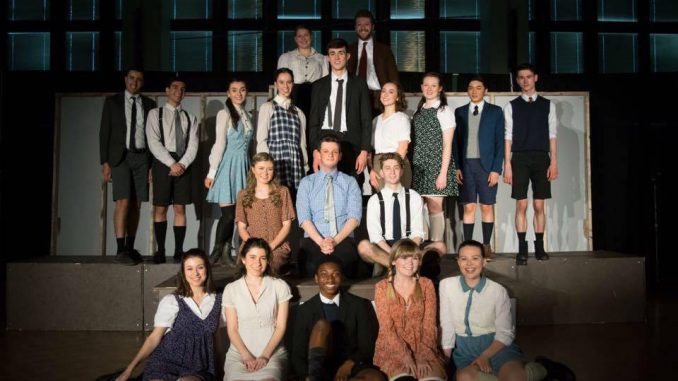
It takes maturity and discipline to perform a musical that covers topics such as teenage sexuality, angst, death, suicide, depression, abuse and self-discovery.
The Miami Theatre Players performed “Spring Awakening” from Wednesday, April 26 to Friday, April 28 in the Student Union Building Multi Purpose Room.
Based off of the German play “Spring Awakening” (1891) by Frank Wedekind, the rock musical adaptation tells the story of teenagers discovering their inner and outer tumult of being a teenager.
Act I sets the scene of the group of immature teenagers that are looking to understand what’s happening to their bodies.
In the opening number, “Mama Who Bore Me,” Weldla Bergman, played by first-year undeclared major Fiona Castro, laments to her mother that she has not prepared her for womanhood.
As Weldla is about to reach puberty, she asks her mother where babies come from, but her mother can’t bring herself to tell her the truth. Instead, she tells Weldla that she can conceive a baby only if she loves her husband very much. The other girls in the town seem to be just as naive and upset with the lack of knowledge.
Weldla sings: “Mama who bore me / Mama who gave me / No way to handle things / Who made me so sad.”
“‘Spring Awakening’ is such an important show because, even though it takes place in 19th century Germany, its themes are so relevant in today’s world,” Castro said.
The boys also lack knowledge in sexuality, except for Melchior Gabor, played by Kyle Sweezy. Mortiz Sthiefel, his friend and classmate, tells Melchior of his erotic dream, which Mortiz believes are signs of insanity. Melchior, whose knowledge of sex comes from books, explains that it’s normal for boys to have erotic dreams at that age.
In a later scene, Martha Bessel, accidentally admits to the girls that her father physically and sexually abuses her. Martha asks the girls not to tell anyone, afraid that she’ll become like Ilse Neuman, a childhood friend who is now homeless because of a similar situation.
In “The Dark I Know Well,” Ilse and Martha sing, “You say, ‘time for bed now, child’ / Mom just smiles that smile / Just like she never saw me / … / I don’t scream, though I know it’s wrong / I just play along / I lie there and breathe.”
Act I ends with Weldla and Melchior discovering each other’s bodies and having intercourse.
Compared to Act I, Act II is much darker, where the musical brings in the themes of depression, suicide and death.
Mortiz leaves his home because his father is ashamed of him for failing his final exam, and is found wandering around town with a pistol in his pocket, which he later uses to shoot himself.
Nearing the end of the show, Weldla and her mother are at the clinic, for she has fallen ill. The doctor tells Weldla that she’s suffering from anemia, but pulls aside her mother to tell her that she’s pregnant. Her mother snaps and takes her to a back-door abortion clinic, where she dies.
A chilling ending to an incredible show, the entire cast cautiously walked out in white lingerie to sing the closing number, “The Song of Purple Summer.” The song represents maturity and growth.
“But still it stays / The butterfly sings / And opens purple summer / With a flutter of its wings.”
“This is not an easy show to put on by any means, and we did it all by ourselves, just some students who had a dream,” said second-year public relations major and director of The Miami Theatre Players Kevin Burns. “I have been a part of my fair share of shows, but I have to be most proud of this one. Each and every actor told this story through the lens of their individual character and that’s what made this show so real.”
